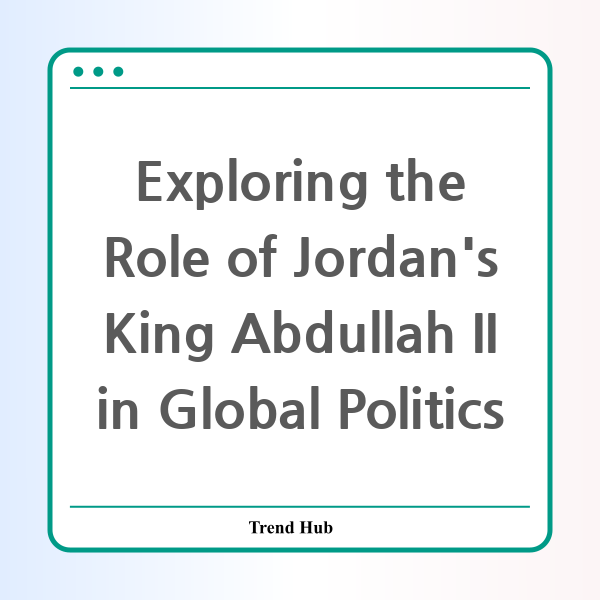* This website participates in the Amazon Affiliate Program and earns from qualifying purchases.

In recent headlines, the spotlight has shone brightly on Jordan's King Abdullah II, especially following significant meetings with influential leaders. As global dynamics shift, the role of King Abdullah II becomes increasingly vital, especially in discussions surrounding the complex geopolitical landscape of the Middle East.
One notable encounter that captured public interest was between President Donald Trump and King Abdullah II during a White House meeting. This meeting highlights the ongoing tensions in the region, particularly concerning the Israeli-Palestinian conflict and the humanitarian situation in Gaza.
King Abdullah II is known for his diplomatic approach and has often positioned himself as a mediator in various Middle Eastern conflicts. His leadership has been characterized by a deep commitment to promoting peace and stability in a region rife with discord. The recent meeting with Trump, wherein the U.S. President suggested the possibility of conditioning aid to Jordan and Egypt based on their acceptance of Palestinian integration into a new proposal, underscores the complexities that King Abdullah faces.
As the King navigates these waters, it is crucial to understand the historical context of Jordan's role in regional politics. Jordan has long been a haven for refugees, hosting a significant number of Palestinians and Syrians. This humanitarian stance, while commendable, places pressure on the nation's resources and stability. With Trump’s provocative statements suggesting potential aid cuts, the King’s diplomatic strategies are put to the test.
Furthermore, King Abdullah II's stance against radicalism and his efforts to promote moderate Islam stand as a testament to his larger vision for the Middle East. By advocating for dialogue and cooperation among nations, he seeks not only to protect Jordan but also to foster a broader regional peace.
In light of these challenges, what does the future hold for King Abdullah II and Jordan? The King's balancing act involves maintaining relations with Western powers while advocating for the rights of Palestinians and managing domestic pressures. His adeptness at handling these delicate issues will determine Jordan's trajectory in the coming years.
As global attention remains focused on the unfolding situation in Gaza and the broader implications for the Middle East, King Abdullah II's proactive diplomacy may prove essential in steering the region towards a more stable future.
In conclusion, the discussions surrounding King Abdullah II highlight the intricate web of political relationships in the Middle East. Keeping a close eye on Jordan's actions and strategies will be vital for understanding the evolving landscape of global politics. The King’s ability to mediate, advocate, and adapt will significantly impact both Jordan and the broader region as they navigate these tumultuous times.
* This website participates in the Amazon Affiliate Program and earns from qualifying purchases.